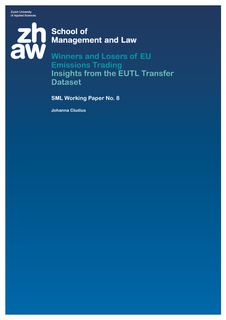Please use this identifier to cite or link to this item:
https://doi.org/10.21256/zhaw-1042| Publication type: | Working paper – expertise – study |
| Title: | Winners and losers of EU emissions trading : insights from the EUTL transfer dataset |
| Authors: | Cludius, Johanna |
| DOI: | 10.21256/zhaw-1042 |
| Issue Date: | Jan-2016 |
| Series: | SML Working Paper |
| Series volume: | 8 |
| Publisher / Ed. Institution: | ZHAW Zürcher Hochschule für Angewandte Wissenschaften |
| Publisher / Ed. Institution: | Winterthur |
| Language: | German |
| Subjects: | Emissions trading scheme; EU ETS; EUTL transfer data; Distributional effects; Free allocation; Two-step selection model |
| Subject (DDC): | 333: Economics of land and resources 338.927: Environmental economics and sustainable development 363: Environmental and security problems |
| Abstract: | This paper analyzes distributional effects the EU Emissions Trading Scheme (EU ETS) created between participants of the scheme during its first trading period. To this end, a dataset recording all transfers during the first period of the EU ETS, originally at account level, was enhanced by adding information about parent companies, firm characteristics, and carbon prices. A two-step selection model was formulated and applied to the data. To account for a number of uncertainties, sensitivity analysis with regard to forward and futures trading was carried out. Findings confirm that free allocation in excess of actual emissions (‹overallocation›) is a major source of gain generated under the Scheme. The fact that small companies are much less likely to participate in trading is a further cause of distributional effects. This paper also discusses that windfall profits obtained by passing through the cost of freely allocated allowances to consumers are likely to dwarf the gains and losses made on the market for EU Allowances. It is therefore quite likely that the majority of companies covered by the EU ETS generated gains during its first period, either through selling overallocation on the market or by generating windfall profits on product markets. Therefore, decisions about the level of free allocation not only have distributional implications for the participants of an emissions trading scheme but determine the distribution of costs and benefits between covered companies and households. |
| URI: | https://digitalcollection.zhaw.ch/handle/11475/1042 |
| Departement: | School of Management and Law |
| Organisational Unit: | Institute of Regulation and Competition (IRW) |
| Appears in collections: | Energierecht & Energy Policy Analysis |
Files in This Item:
| File | Description | Size | Format | |
|---|---|---|---|---|
| 2016_Jan_Cludius_EU_ETS_winners_losers (A).pdf | 702.6 kB | Adobe PDF |  View/Open |
Show full item record
Cludius, J. (2016). Winners and losers of EU emissions trading : insights from the EUTL transfer dataset. ZHAW Zürcher Hochschule für Angewandte Wissenschaften. https://doi.org/10.21256/zhaw-1042
Cludius, J. (2016) Winners and losers of EU emissions trading : insights from the EUTL transfer dataset. Winterthur: ZHAW Zürcher Hochschule für Angewandte Wissenschaften. Available at: https://doi.org/10.21256/zhaw-1042.
J. Cludius, “Winners and losers of EU emissions trading : insights from the EUTL transfer dataset,” ZHAW Zürcher Hochschule für Angewandte Wissenschaften, Winterthur, Jan. 2016. doi: 10.21256/zhaw-1042.
CLUDIUS, Johanna, 2016. Winners and losers of EU emissions trading : insights from the EUTL transfer dataset. Winterthur: ZHAW Zürcher Hochschule für Angewandte Wissenschaften
Cludius, Johanna. 2016. “Winners and losers of EU emissions trading : insights from the EUTL transfer dataset.” Winterthur: ZHAW Zürcher Hochschule für Angewandte Wissenschaften. https://doi.org/10.21256/zhaw-1042.
Cludius, Johanna. Winners and losers of EU emissions trading : insights from the EUTL transfer dataset. ZHAW Zürcher Hochschule für Angewandte Wissenschaften, Jan. 2016, https://doi.org/10.21256/zhaw-1042.
Items in DSpace are protected by copyright, with all rights reserved, unless otherwise indicated.